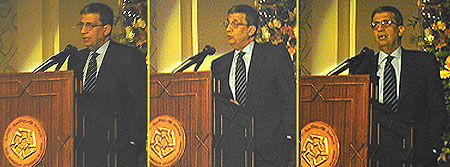|
|
|
Moussa's
message to Sharon
Hit the
Palestinians and they will hit back, the Arab League chief tells a Cairo
crowd
Photos and text
by Tarek Atia
(cairolive.com, March
6, 2002) Arab League
Secretary General Amr Moussa's comments in Cairo on Tuesday evening
seemed to take on added significance as the Israeli-Palestinian conflict
witnessed its deepest descent into full-scale war since the Intifada
began 18 months ago. "It has become clear to the Israeli people
that the policies of the past year and a half are a failure,"
Moussa said.

And yet it was all
to clear that Israeli Prime Minister Ariel Sharon seemed bent on
continuing to pursue those very same failed policies. With overtures for
peace appearing from every side, Moussa said, look how the Israeli
leadership reacts. "We are going to hit them til they cry mercy?
What a reaction? What a response." And, Moussa added, "It will
not go unanswered."
|
Moussa
mania
The way the crowd
reacts to Arab League Secretary General Amr Moussa is certainly
a phenomenon of sorts. He gets an unbelievable reception and
looks of admiration from every side. In Moussa
appeal at the fair, Al-Ahram Weekly's Dina Ezzat described
the phenomenon in detail, and reveals that there is yet another
song about the Secretary General. It certainly isn't as catchy
as Shaaban Abdel-Rehim's ditty heard round the world "I
Hate Israel and I Love Amr Moussa", but, Ezzat reports,
it reflects the "climax in Moussa-mania".
Arab
vision
When it comes to
finding a brighter future for the Arab world, Arab League
Secretary General Amr Moussa says the picture is not all that
bleak. By extending a hand to civil society, the 60,000 NGOs in
the Arab world "that are no longer at the margins of
politics", establishing partnerships between Arabs
worldwide, and by capitalizing on the potential of the private
sector, the region can see a prosperous, fruitful future. The
catch? There are only two: 1)It has to be pursued by collective
hard work. 2)The Arab-Israeli crisis must be properly addressed.
Sharon's
war
The Intifada began
after Israeli Prime Minister Ariel Sharon stormed Jerusalem's
Noble Sanctuary in September 2000, but its roots are in
resistance to an Israeli occupation of Arab land that has
continued unchecked since 1967. The Palestinian leadership has
made it clear that peace is the only option, but nearly a decade
of an Oslo peace process that was accompanied by few if any
results, bred frustration that has been difficult to control.
Sharon seems to take that approach to its extreme via, a
continuing string of unattainable demands accompanied by
escalations of military action -- things like asking Arafat to
reign in militants while bombing his police headquarters at the
same time.
Lending a
hand
Bahgat Korany,
faculty advisor to The American University in Cairo's Model
United Nations conference, told the audience that Egyptian
national universities were thinking of emulating the AUC's MUN.
"We encourage that," he says. "We think our role
at AUC is to help the national universities as much as we
can." Earlier this year Cairo University seemed to take a
cue from its American counterpart by introducing
an award named after Naguib Mahfouz. |
The endless cycle of
reprisals -- "retaliations for retaliation"-- was veering
closer to becoming a constant, instantaneous march of death. In the
past few days 61 Palestinians and 31 Israelis had been killed, with no
end in sight to the military strikes, suicide bombings, missiles fired
from helicopters, and overall devastation being wrought to both sides,
and subsequently, to the region as a whole.
"Every action
has a reaction," Moussa told the crowd gathered at the American
University in Cairo for the opening of the university's 14th Model
United Nations conference. The audience was anxious to hear Moussa's
brand of -- as described by AUC Provost Tim Sullivan while introducing
the Arab League Secretary General --"muscular diplomacy." As
Moussa spoke on ways to improve the Arab world, a "vision for a
prosperous, fruitful future" that was only possible "if
pursued by collective hard work," outlining the plan in point form,
the audience of students, celebrities, and politicians wondered when
they would get what so many had gathered to hear: Moussa's straight talk
on where the Palestinian-Israeli conflict was heading.
Sharon's attitude is
"the road to disaster for all, including the Israeli society,"
Moussa said. "Oppress them, they will resist. Hit them, they will
hit back."
At the same time, it
was imperative that the Arab-Israeli issue be resolved. "There are
no victors or vanquished in this historic case. Only through peace can
both be victors."
Moussa said it would
not be an Israeli-imposed peace. He said Arab resistance had disproven
Israeli myths that a military solution was possible, and that the Arabs
would eventually give in.
Moussa was back at
the University as the keynote speaker at the opening of its annual
simulation of the world governing body. He had been the Model United
Nation's keynote speaker at its first session 14 years ago. The Arab
League Secretary General was showing his priorities, the university's
Sullivan said, "by talking to students in the midst of a busy
schedule meeting Prime Ministers and Presidents."
And in fact it did
seem a priority, as Moussa brought his speech full circle, saying the
students gathered here --from the AUC, and other Egyptian and foreign
universities -- to participate in an open-minded exercise in global
diplomacy, were learning the skills needed to take the region to the
brighter future he had so optimistically described.
Click
here to browse the complete dispatch archives
WHAT
DO YOU THINK?

MAKE YOUR
VOICE HEARD
Send a comment to cairolive.com

Disclaimer
and Terms of Use
© Copyright 1996-2005 cairolive.com. All Rights Reserved
|
|

Read
Tarek Atia's web log
Find
out how
the world media sees Egypt...
UPDATED DAILY!

The ultimate
East-West
world-view

Instant Arabic headlines
|
|